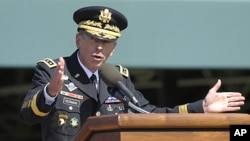In his previous job as the U.S. commander in Afghanistan General David Petraeus had some familiarity with CIA operations and analysis as a consumer of intelligence. Now as CIA director he becomes responsible for producing that intelligence for the president and policymakers. Petraeus takes over an agency that has become increasingly militarized to fight terrorism, blurring lines between the CIA and the military.
Intelligence historian Amy Zegart says the senior CIA leadership will be sizing up David Petreaus as soon as he walks through the portals of the agency’s headquarters in suburban Virginia.
“He comes in with enormous credentials and, I think, a great deal of respect," she said. "But I suspect that within the building, both on the analytic side and on the operations, there is going to be some hesitation about whether he is a military guy who has decamped to CIA, or whether he is really an intelligence person who is going to fight for the CIA and understand the agency.”
Challenge ahead
Zegart, a senior fellow at Stanford University’s Hoover Institution, says he will have to win over people at CIA whom he may have alienated when he was an advocate and enforcer of policies that some at CIA opposed.
“Petraeus is intimately connected with strategies in Iraq and Afghanistan that the CIA has been very skeptical about. And so now he is in the position of having to speak truth to power, yet he is the architect of a lot of these policies. That puts him in a very uncomfortable position,” said Zegart.
But Thomas Fingar, the former chair of the National Intelligence Council, a kind of board of directors for the intelligence community, says the leadership at Langley will give Petraeus a chance. He doubts things will deteriorate to the level they were under former director Porter Goss, an ex-agency officer turned politician who deeply alienated top career CIA employees during his nearly two-year tenure.
“In the years I have been around this the default setting is benefit of the doubt," he said. "And it takes rather extraordinary things like the behavior of Porter Goss and his team that sort of lost the professional crew at the agency. I do not see a ‘we will withhold services, we will hold back, we will sort of judge.’ But certainly they will want to see how he does, how he interacts, how personable is he, how much time does he devote to the agency as opposed to activities outside of the agency.”
Petreaus has no direct intelligence experience. But the CIA has had five military officers in charge before, and all of but one of them stayed on active military service while at CIA. Fingar, also a senior fellow at Stanford, says Petraeus, who did retire from the army to take the CIA job, needs to be more bureaucrat than spy.
“What the agency, any agency, sort of needs is a good manager that can juggle tasks and can interact with the White House, interact on the Hill [Congress], interact now with the Pentagon on a lot of things. No reason to think that Petraeus is less capable of the managerial aspects of this. There are plenty of people around who know intelligence and can provide guidance for him,” he said.
'CIA-military closeness'
Amy Zegart says that intelligence, especially at the CIA, has become more militarized in the 10 years since September 11, 2001, as evidenced by drone strikes and special forces operations against terrorist targets. The CIA and the military are cooperating closer than ever before, she says, and notes that the new defense secretary is Leon Panetta, who was Petraeus’ immediate predecessor at the CIA.
But Zegart, who has written a new book on Congressional oversight of intelligence, says the growing CIA-military closeness raises some questions of oversight. “The downside of this story is that accountability is much more difficult. Are operations that are inherently intelligence conducted by military personnel subject to the same oversight as intelligence activities by CIA people? The answer is no. So there are real questions about accountability and capability and which organization is best suited to do what functions,” she said.
The CIA director used to be the president’s senior intelligence advisor. But in late 2004, Congress created the post of director of national intelligence to oversee the whole intelligence community as part of a package of post 9-11 intelligence reforms. Thomas Fingar, who served as deputy director of national intelligence, says the CIA director has still maintained much of his clout in the White House.
“For a variety of reasons - familiarity, personality, continuity - the CIA under both Bush and Obama has retained something, and sometimes a great deal, of its old standing with the director of CIA because of the role of covert action, and the stuff that is not really covert but is done under intelligence authorities,” he said.
If that holds true, Amy Zegart says, Petraeus will have to ensure he does not overshadow the Director of National Intelligence, James Clapper.
“One of critical issues will be, especially with Petraeus’ outsize public image, will the CIA continue to eclipse the director of national intelligence as the leader of the intelligence community," she said. "For the community to really work well the director of national intelligence really has to run it. And so that is one of the outstanding questions that we are just to have to wait to see what happens.”
How long David Petreaus will remain in his new job is unknown. The CIA director serves, as the law says, at the pleasure of the president.
US Afghan War Commander Takes Helm at CIA




